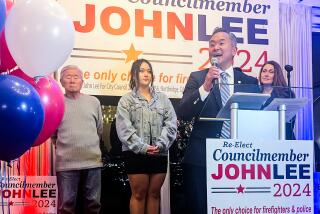It’s Time for the Candidates to Campaign Like a Mayor : Election: No more snatching support from narrow constituencies. What’s needed is an overarching vision of governance and community.
- Share via
Mom always said follow the Golden Rule: He who has the gold makes the rules. It sure worked for candidates Richard Riordan and Michael Woo in the mayoral pri mary. It worked because the me dia and the voters let them get away with it. And the dust kicked up by fast-breaking events and fractious candidates made it easy to dodge hard questions. Woo and Riordan confront stiffer tests in the runoff.
The size and diversity of Los Angeles, coupled with the complexity of its problems, tend to make the election for mayor more like a race for governor or senator than for local office. And, in California, statewide elections are won in the center. You can already sense the gravitational pull as liberal Woo shifts right and conservative Riordan swings left in trying to moderate their stands.
In Los Angeles, demographics and registration should favor Democrat Woo. But if that means the electoral arithmetic may be harder for Republican Riordan, it is not impossible. Moderate Democrats, Latinos and Jewish voters cannot be taken for granted--and must not be ignored--by either candidate.
Primary voting in minority areas was reported to be from 5% to 7% below voting in predominantly Anglo areas. A number of closely contested City Council and school board races involved the San Fernando Valley, the heart of Riordan Country, and that may have increased Riordan’s margin over Woo.
If that disparity in turnout shows up in June, it could be costly for Woo, who counts on minority voters as the foundation of his electoral coalition and whose stands on key issues may not resonate with those of Tuesday’s heavily Anglo, more moderate electorate.
There is more potential danger for Woo in the primary turnout figures. The Times exit-poll numbers indicate that higher-income voters favored Riordan; Woo’s support came from lower-income brackets. Income and turnout are related. The lower the turnout, the more affluent the voters will be. That would help Riordan.
The passage of local term limits shows that voters really don’t cotton to entrenched incumbents hanging around too long in the halls of government. Riordan claimed this issue early, sponsoring his own term-limit measure on the ballot. He appears to have persuaded many voters that he’s hardly ever been to City Hall, let alone hung out there. On the other hand, as an incumbent council member, Woo will have to navigate a tricky course between bashing his City Hall colleagues and escaping blame for their failures.
By ducking the hard questions of government financing, the candidates contribute to keeping the city in fiscal crisis. That’s bad news for anyone who wants to govern the city, but the tidings are particularly glum for Woo.
Mayor Tom Bradley’s proposed $3.8-billion budget calls for layoffs and cuts in city services to erase an estimated $190-million deficit. Hearings on his proposal begin just as the runoff campaign gets under way. The City Council is required to ratify or amend the budget by June 1, right before the election.
A rancorous fight over the city budget could saddle Woo with heavy baggage. Brutal program cuts, uncontrolled deficits or a deadlocked process could undercut his argument that government can work and he can make it work better. It would also leave Riordan an opening to tout his business savvy and “outsider” status, two issues that won him support.
But can Riordan sustain his white-knight pitch in the runoff? As a public figure, Woo is more of a known quantity; his negatives have been out there for some time. Riordan, as yet, hasn’t had to undergo intense scrutiny.
Will Riordan wear well in the sustained glare of the media spotlight? Will negative attacks, tossed about in the crowded primary campaign by Woo and others, be more likely to hit their mark?
We’ll know the answers when voters give Riordan and Woo their final exam. Unlike the primary, this test will not be multiple choice. It cannot be passed by merely snatching support here and there from narrow constituencies. It requires shaping an overarching vision of governance and community in Los Angeles.
All the primary contenders failed that exercise. Only 15% of the respondents to The Times exit poll indicated their candidate had a clear vision of the future and an appalling 5% rated him or her best qualified to handle a crisis. Now candidates Woo and Riordan have a chance to take that test again.
So pencils up, gentlemen. You have six weeks to define the city you want to lead. You’ll lose points every time you toss trash at one other. With only two competing visions of the city, media and public attention should be more focused. And there will be a slew of hard graders out there ready to vote pass or fail.
DR, NANCY OHANIAN / For The Times
More to Read
Sign up for Essential California
The most important California stories and recommendations in your inbox every morning.
You may occasionally receive promotional content from the Los Angeles Times.













